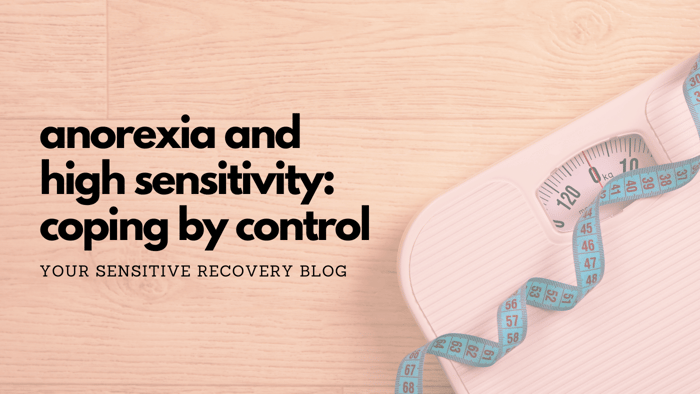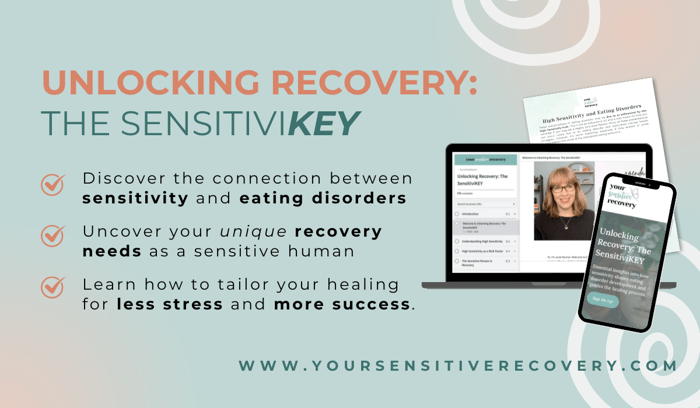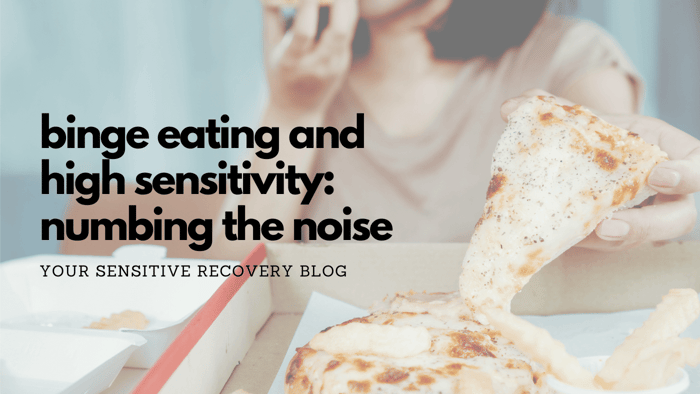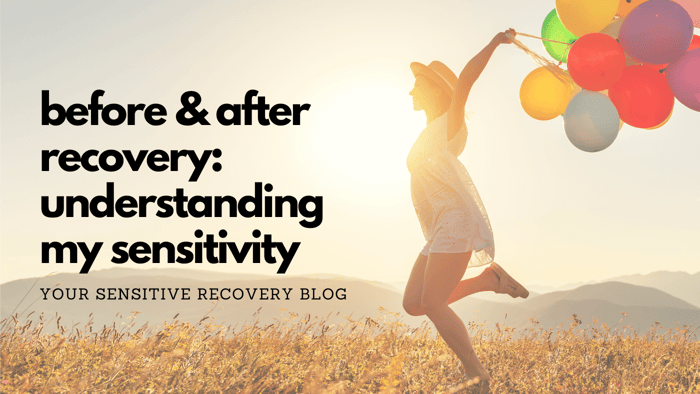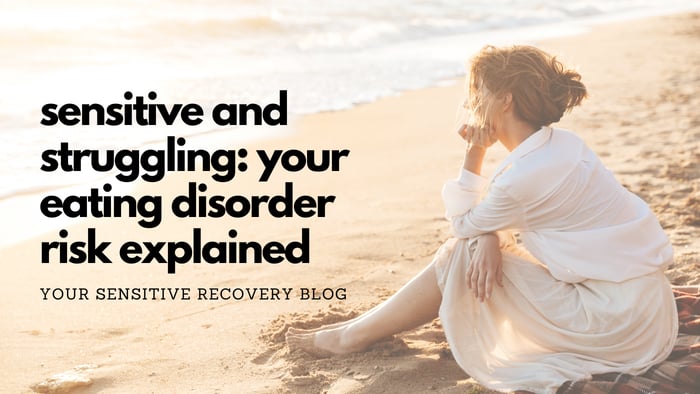As a therapist specializing in the treatment of eating disorders, I've come to learn that individuals with Anorexia Nervosa tend to exhibit the characteristics of High Sensitivity (also known as Sensory Processing Sensitivity). Yet, this connection is often overlooked. Reflecting on my own recovery from anorexia, I can see how my emotional, sensory, and environmental sensitivities shaped my struggle, and how the eating disorder became a way to cope with a trait I didn’t even know existed.
Highly Sensitive People (HSPs) are uniquely affected by both inner and outer experiences, making them more vulnerable to maladaptive coping mechanisms such as an eating disorder.
This post is the first in a series exploring how High Sensitivity influences the development and maintenance of different eating disorders and why addressing sensitivity is key to a full recovery.
👉 NOTE: While this post focuses on Anorexia, much of the content also applies to Atypical Anorexia, Other Specified Feeding and Eating Disorders (OSFED), and sub-clinical disordered eating (even dieting!) where restriction is a primary behavior.
What Does It Mean to Be Highly Sensitive?
Being a Highly Sensitive Person means experiencing the world with extraordinary awareness. HSPs are deeply attuned to their emotions, the energy of others, and subtle shifts in their environment. Only 15-30% of the population is thought to be Highly Sensitive.
While this biological trait imparts a sense of deep connection and intuition, it can also lead to stress, self-doubt, and overstimulation in a society that undervalues sensitivity.
"I'm constantly aware of what everybody around me is feeling. Even watching new tv shows feels too intense. I never know what emotions I'll have to deal with." - Aiden (42 yrs)*For some HSPs, especially those in high-pressure or invalidating environments, the intensity of life can drive them to seek distraction, power, and a sense of safety - sometimes through food restriction. Without understanding their sensitivity, HSPs may turn to the hyper-control of food and weight as a way to manage whatever else feels unmanageable.
Understanding Anorexia Nervosa
Anorexia nervosa is an eating disorder characterized by intense fear of weight gain, severe food restriction, and obsessive behaviors like calorie counting, frequent weighing, and rigid eating rules. These behaviors often initially develop for the pursuit of weight loss, but over time they begin to serve other purposes which we'll explore shortly.
While anorexia may outwardly seem to center on food and body image, its roots are much deeper.
At its core, it reflects profound emotional and psychological struggles, like perfectionism, people-pleasing, fear of failure, and difficulty processing and expressing emotions.
For many, the act of restricting food and fixating on body size creates an illusion of control over their lives, offering a temporary reprieve from feelings of powerlessness or uncertainty. However, the idea that anorexia is simply “about control” oversimplifies the experience. Beneath the surface, individuals with anorexia often describe feeling as though they are caught in a relentless cycle of self-doubt and rigidity, and fear they are always seconds away from losing all control.
How High Sensitivity Can Fuel Restriction
For HSPs, life can feel like a constant balancing act between deeply experiencing the world and managing its intensity. Restriction can dull emotional reactions and quiet sensory overload.
"I was so exhausted from taking care of my toddler that I started eating less unintentionally. I realized it made me feel less overwhelmed by his constant needs and noise. I couldn’t physically step away from him, so I kept disconnected emotionally by starving." - Sarah (29 yrs)*In the quote above, anorexia served as an obvious coping mechanism and provided Sarah with temporary relief from emotional and sensory overload. Unfortunately, it ultimately led to her feeling disconnected from her child, her partner, and everything that gave her life meaning.
Unlike non-HSPs, who often feel increased anxiety when restricting food, many Highly Sensitive People report a sense of "calm" or numbness instead. For some, this numbing effect can be addicting, and feel absolutely necessary to protect.
Along with numbing, the hyper-management of food offers a distraction from overwhelming life situations. It becomes something that people-pleasing HSPs can have all to themselves - something with which nobody else can interfere. Over time, it can feel like a "trait" in its own way.
"The longer I struggled with my eating disorder, the more it felt like who I was. I became known as the small, super-disciplined one. I finally felt normal, and I didn't want to give that up." Cameron (26yrs)*HSPs often grow up feeling different. We're told that our sensitivity is a problem to be fixed, and we wrestle with feeling like we're too much AND not enough at the same time.
Being deeply attuned to the expectations and judgments of others, Highly Sensitive People are more susceptible to peer and societal pressures. In our fatphobic culture, thinness is the dangling carrot of success, acceptance, and happiness, and weight loss can feel like the path to belonging.
Honoring Sensitivity in Recovery
To fully recover from anorexia, it’s essential to address not just the symptoms and behaviors, but also the underlying sensitivity that may have contributed to the eating disorder.
Key Areas to Focus on in Recovery:
- Understand High Sensitivity: Learn about the trait - both the challenges it presents and its gifts.
- Grieve the Struggles: Acknowledge the pain of living as a sensitive person in an insensitive world and the pain of letting go of a coping mechanism that worked.
- Practice Unconditional Self-Compassion: Counter perfectionism and self-criticism with kindness, no matter what. No "earning it" required.
- Reframe Your Cues: Begin seeing your body's signals as intuitive messages rather than liabilities, weaknesses, or annoyances.
- Seek Validation: Connect with other HSPs for support and educate loved ones about your unique needs.
- Set Boundaries: Reduce overstimulation by protecting your energy wherever possible.
You Are Not Too Sensitive
If you see yourself in this connection between High Sensitivity and anorexia, know this: your sensitivity is not a flaw. While it may have shaped your eating disorder, it also holds the key to a fulfilling recovery.
Your sensitivity is a powerful and beautiful part of who you are.
By developing effective HSP-friendly tools and embracing your sensitive characteristics as a source of strength, you can create a life that is balanced, nurturing, and truly fulfilling.
You are not too sensitive, too broken, or too far gone. You are learning how to navigate the world in a way that supports your sensitive heart.
And that is a journey worth taking.
* Names and other identifying details have been changed to protect privacy.
✨ Josie Munroe, LMFT is a licensed therapist and owner of JosieMunroe.com and Your Sensitive Recovery. As a recovered clinician and Highly Sensitive Person, she loves supporting others on their journeys to form new, empowered relationships with food, their bodies, and their sensitivity. Join the newsletter for a weekly boost of hope and inspiration. You deserve a recovery that works for you! ✨

